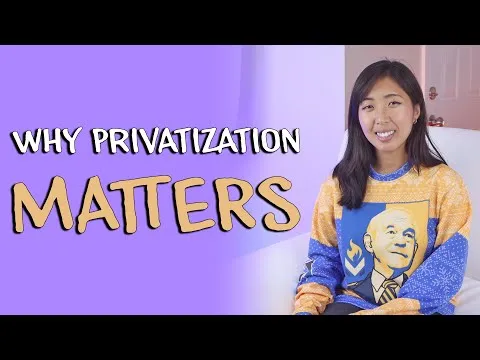I go over why privatization matters.
Catch behind-the-scenes posts and help choose my next video topic at:
Patreon: https://www.patreon.com/thepholosopher
SubscribeStar: https://www.subscribestar.com/the-pholosopher
Flote https://flote.app/thepholosopher/support
Why Privatization Matters
Before we can get into why privatization matters, we must first define what privatization is.
Privatization is a human psychology where people view certain scarce physical resources as being rightfully controlled by discreet human beings labelled as “owners.”
Owners have the ultimate right of discretion over how property may be used subject to not physically infringing on the physical property of others.
How people may arrive at this psychology may vary.
For example, some adopt a psychology of privatization out of a fear of consequences, such as a fear of what may happen to them if they take what someone else has claimed.
Some develop this psychology out of a religious framework, where their spiritual beliefs hold that stealing is wrong and, thus, set a groundwork for what ethical property rights are through a religious text.
Others, like myself, do so out of an empathetic reciprocity, that is, out of a desire to be respected in physical autonomy.
Those who share my views adopt this psychology with the hopes of having it reciprocated.
From a libertarian perspective, the concept of property rights is rooted in the first principle of self-ownership.
While some may claim that self-ownership is a tautology due to the question of what makes “self,” we can consistently see self-ownership springing from how the brain exerts impulses and control over the body, synchronizing consciousness with physical control over scarce resources, namely, the tissues, bones, and organs attached to the brain.
It is from this point we can start to see why privatization matters and why property rights are so crucial for having peace and prosperity.
If your body is not private, that is, you are not viewed as having the highest authority over it, violent conflict can arise.
Someone who tries to use another’s body for sex, labor, or organ harvesting without the consent of the individual private owner will end up initiating force against the body of the unwilling participant.
As it is logically impossible to want one’s consent to be violated, any deviation from consent in use of one’s body inherently leads to violent conflict, with one person trying to force their desires onto the body of another.
Because every human being has a body, it is easy to see why adopting a reciprocal property rights psychology would be beneficial to reducing violent conflict of people fighting each other over how their bodies are used.
And this empathetic reciprocity, once realized, can also be applied outwardly to other forms of physical property, to help avoid conflict.
To survive, people need food, water, air, and a safe shelter from the elements.
Without a respect for privatization, people would fight each other over those needed resources, making it difficult to survive with the constant looming threat of human predators.
When people have a shared view on how privatization is manifested, they can feel secure that their neighbors are not going to take food out of their hands as it is about to be eaten, or have their neighbors raid their home in the middle night, disturbing their sleep.
When there is a lack of respect for privatization, or the social psychology lacks true privatization with an exclusive owner, conflict can exponentially grow.
Take for example the state-crafted idea of a “public good” like a “public park.”
Those in the government claim that the park is owned by the public, yet it is not possible for each person in the public to use the park simultaneously without physically denying use to others.
The swings have limited seats.
Benches have limited spots.
There’s only so much room to have a view of the sunset atop of a pond-facing flat rock.
When the government fosters conflict via the label of “commons,” they create opportunities for people to fight each other over what the supposed “best use” is for the common resource.
This leads to people trying to use government law and police to control how the resource is used even though it is claimed to be a tax-funded resource equally open to all residents.
Privatization is paramount here to ending the ruse as it sets up the psychology of a discreet owner instead of the farce of thousands of “owners” all competing over how the park is used.
When privatization is manifested and accepted socially, then people can also make economic decisions with their resources more effectively.
They can know that they have the final say in how an object, building, or piece of land is to be used, and they can make deals with others to trade for mutual benefit with the trade’s outcome being respected.
The closer we come to having a cultural-wide respect of property rights, the closer we get to having both respect and responsibility for our actions and our possessions.
Which is why a move toward an ethical future is one where privatization is normalized and encouraged.
#propertyrights #privateproperty #privatization #libertarian #philosophy #libertarian #libertarians #taxationistheft #mises #rothbard #hayek #sowell #economics
#propertyrights #privateproperty #privatization #libertarian #philosophy
